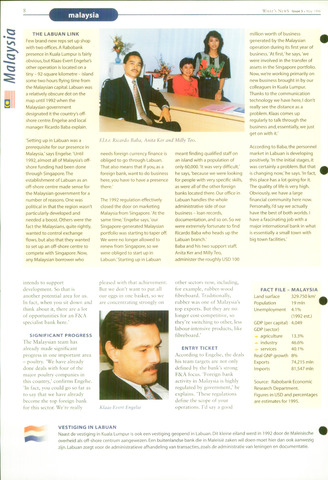malaysia
CS
8
WHAT'S NewS Issue 5 May 1996
million worth of business
generated by the Malaysian
operation during its first year of
business. 'At first,' he says, 'we
were involved in the transfer of
assets in the Singapore portfolio.
Now, we're working primarily on
new business brought in by our
colleagues in Kuala Lumpur.
Thanks to the communication
technology we have here, I don't
really see the distance as a
problem. Klaas comes up
regularly to talk through the
business and, essentially, we just
get on with it.'
According to Baba, the personnel
market in Labuan is developing
positively. 'In the initial stages, it
was certainly a problem. But that
is changing now,' he says. 'In fact,
this place has a lot going for it.
The quality of life is very high.
Obviously, we have a large
financial community here now.
Personally, l'd say we actually
have the best of both worlds. I
have a fascinating job with a
major international bank in what
is essentially a small town with
big town facilities.'
'Setting up in Labuan was a
prerequisite for our presence in
Malaysia,'says Engelse.'üntil
1992,almost all of Malaysia's off
shore funding had been done
through Singapore.The
establishment of Labuan as an
off-shore centre made sense for
the Malaysian government for a
number of reasons. One was
political in that the region wasn't
particularly developed and
needed a boost. Others were the
fact the Malaysians.quite rightly,
wanted to control exchange
flows, but also that they wanted
to set up an off-shore centre to
compete with Singapore. Now,
any Malaysian borrower who
THE LABUAN LINK
Few brand-new reps set up shop
with two offices. A Rabobank
presence in Kuala Lumpur is fairly
obvious, but Klaas-Evert Engelse's
other operation is located on a
tiny - 92-square kilometre - island
some two hours flying time from
the Malaysian capital. Labuan was
a relatively obscure dot on the
map until 1992 when the
Malaysian government
designated it the country's off
shore centre. Engelse and local
manager Ricardo Baba explain.
F.l.t.r. Ricardo Baba, Anita Ker and Milly Teo.
meantfinding qualified staffon
an island with a population of
only 60,000. 'It was very difficult,'
he says, 'because we were looking
for people with very specific skills,
as were all of the other foreign
banks located there.Our office in
Labuan handles the whole
administrative side of our
business - loan records,
documentation, and so on. So we
were extremely fortunate to find
Ricardo Baba who heads up the
Labuan branch.'
Baba and his two support staff,
Anita Ker and Milly Teo,
administerthe roughly USD 100
needs foreign currency finance is
obliged to go through Labuan.
That also means that if you,as a
foreign bank, want to do business
here, you have to have a presence
there.'
The 1992 regulation effectively
closed the door on marketing
Malaysia from Singapore. 'At the
same time,' Engelse says, 'our
Singapore-generated Malaysian
portfolio was starting to taper off.
We were no longer allowed to
renew from Singapore, so we
were obliged to start up in
Labuan.'Starting up in Labuan
intends to support
development. So that is
another potential area for us.
In fact, when you sit down and
think about it, there are a lot
of opportunities for an F8cA
specialist bank here.'
SIGNIFICANT PROGRESS
The Malaysian team has
already made significant
progress in one important area
- poultry. 'We have already
done deals with four of the
major poultry companies in
this country,' confirms Engelse.
'In fact, you could go so far as
to say that we have already
become the top foreign bank
for this sector. We're really
pleased with that achievement.
But we don't want to put all
our eggs in one basket, so we
are concentrating strongly on
Klaas-Evert Engelse
other sectors now, including,
for example, rubber-wood
fibreboard. Traditionally,
rubber was one of Malaysia's
top exports. But they are no
longer cost-competitive, so
they're switching to other, less
labour-intensive products, like
fibreboard.'
ENTRY TICKET
According to Engelse, the deals
his team targets are not only
defined by the bank's strong
F&A focus. 'Foreign bank
activity in Malaysia is highly
regulated by government,' he
explains. 'These regulations
define the scope of your
operations. I'd say a good
FACT FILE - MALAYSIA
Land surface 329.750 km'
Population 19 min
Unemployment 4.1%
(1992 est.)
GDP (per capital) 4,049
GDP (sector)
agriculture 13.3%
industry 46.6%
services 40.1%
Real GNP growth 8%
Exports 74,215 min
Imports 81,547 min
Source: Rabobank Economie
Research Department.
Figures in USD and percentages
are estimates for 1995.
VESTIGING IN LABUAN
Naast de vestiging in Kuala Lumpur is ook een vestiging geopend in Labuan. Dit kleine eiland werd in 1992 door de Maleisische
overheid als off-shore centrum aangewezen. Een buitenlandse bank die in Maleisië zaken wil doen moet hier dan ook aanwezig
zijn. Labuan zorgt voor de administratieve afhandeling van transacties, zoals de administratie van leningen en documentatie.

